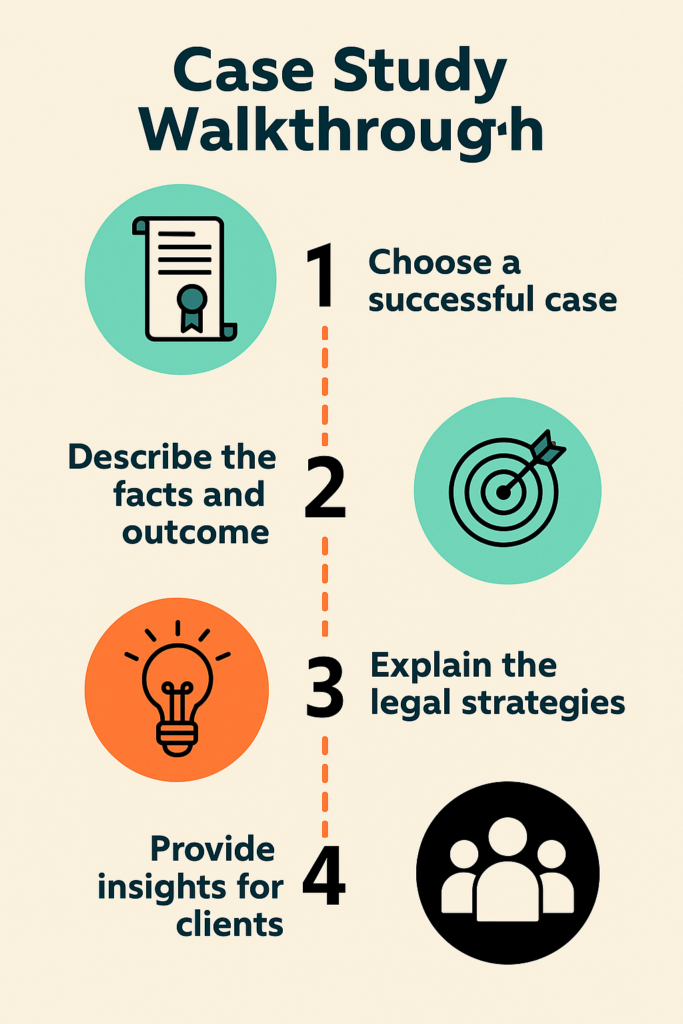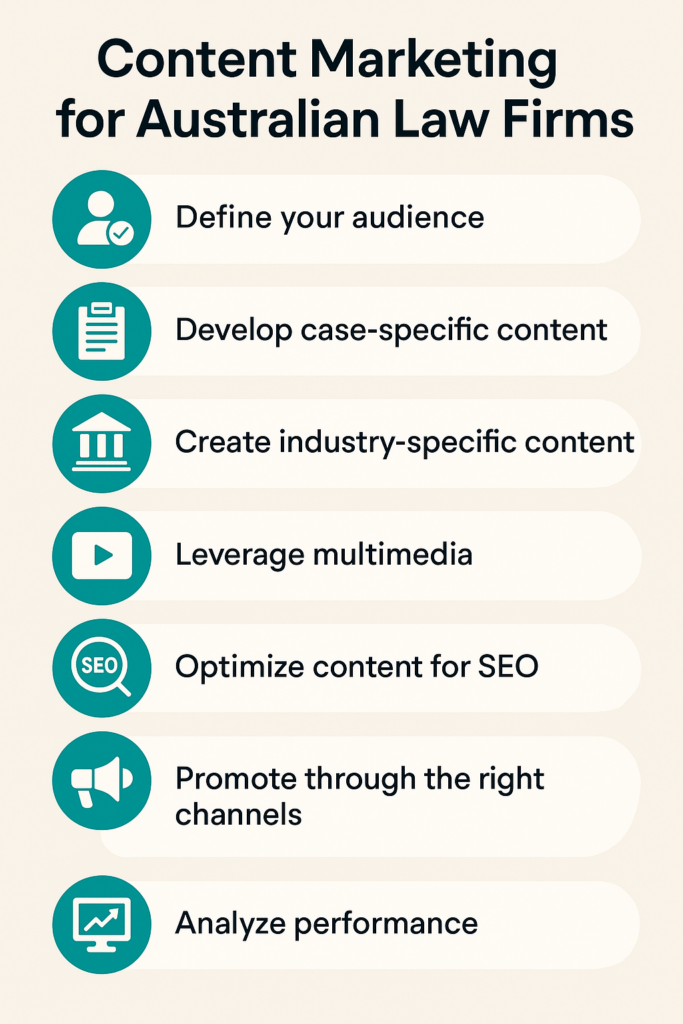Content marketing for Australian law firms: Real strategies for attracting more clients
In today’s competitive Australian legal landscape, small law firms often grapple with limited time, budgets, and marketing expertise. But here’s the good news: content marketing isn’t just for big firms with marketing teams—it’s one of the most effective, low-cost ways for small firms to consistently attract and retain the right kind of clients.
In this guide, we’ll skip the theory and show you real examples of how content marketing works for Australian law firms—especially smaller practices looking to build trust, visibility, and local authority online.
Define your target audience by matter type
Every legal practice area attracts a different kind of client. You can’t write content for “everyone” and expect it to convert.
Example (family law):
A sole practitioner in Sydney noticed most of their calls were about parenting arrangements during separation. They created a short article titled:
“Can I move out with my kids before a custody order is made in NSW?”
That single blog post now ranks for several long-tail search terms and drives multiple leads each month.
👉 Use your intake calls and consultation questions as your content inspiration. Write like you’re answering one client at a time.
Localise your content wherever possible
Many law firms publish blogs like “What is probate?” or “What happens after an arrest?” But those topics are everywhere—and not tailored to your area.
Example (estate planning – South Australia):
Instead of a generic FAQ, a firm in Adelaide wrote:
“Who can contest a will in South Australia? What the law says in 2025”
It referenced local legislation, included real case examples (without names), and linked to their service page. Within weeks, it ranked for key terms in their area.
👉 Localised content shows up in Google for searchers in your city or state—and builds trust that you understand the local process.
Build topic hubs by practice area
Search engines reward websites that go deep, not just wide. Even if you’re a one-person firm, you can build a “content cluster” that shows depth in your expertise.
Example (conveyancing – Brisbane):
A small suburban firm created a mini-hub of 5 posts under a page called:
“Buying your first home in Queensland”
Posts included:
-
What is a cooling-off period in QLD?
-
How stamp duty works for first-home buyers in Brisbane
-
Settlement day: what to expect
Each post linked to the others, and all pointed back to their conveyancing services page. The result? More time on site, more leads from Google, and clients who were better informed when they called.
👉 Need help building a content hub? Talk to our digital marketing team.
Turn every FAQ into a blog post
You probably answer the same 10 questions every week. Each of those deserves its own blog post or explainer video.
Examples:
-
“How much does it cost to get a will drafted in VIC?”
-
“Can I get a drink driving charge removed from my record?”
-
“What is considered unfair dismissal under Fair Work Australia?”
By writing clear, honest, and specific answers (with your location in mind), you’ll rank better and reduce wasted time in consultations.
👉 Bonus tip: Add those FAQs to your website design for lawyers homepage or service pages.
Repurpose content on social media
You don’t need to reinvent the wheel for every platform. Use the content you’ve already written and repurpose it in different formats.
Example (criminal law – Parramatta):
After writing a blog post titled “What to do if you’re charged with mid-range drink driving in NSW,” one small firm:
-
Created a short video summarising 3 key steps (posted to Instagram Reels)
-
Designed a simple Canva graphic with the penalties and process
-
Posted a link and a quote from the blog on LinkedIn
-
Shared the same article to their Google Business profile
Result: More visibility across platforms, without spending extra hours.
Share real (anonymised) case studies
Client success stories are one of your most powerful forms of content—especially when anonymised and focused on the outcome.
Example (criminal law – Perth):
One solo lawyer published a post titled:
“How we helped a FIFO worker avoid licence suspension after a second drink-driving offence”
They walked readers through the case: charges, court strategy, and outcome. No names, no details—just proof of expertise. That post led to two similar consultations the same month.
👉 These don’t need to be long. Just structure it as: problem → process → result → next steps.
Create helpful downloads and checklists
Offer short downloadable tools that help your potential clients understand their situation.
Examples:
-
“Separation checklist – What to organise before you move out” (family law)
-
“Checklist: Buying a property in NSW – Documents, deposits, and legal steps” (conveyancing)
-
“Guide: What to bring to your first appointment” (general)
👉 These tools build trust and can be offered in exchange for an email address to start a conversation.
Offer local webinars or Q&A sessions
Live content (even on Facebook or Zoom) helps you build rapport and show your face to your community.
Example (employment law – regional WA):
A small firm hosted a free 30-minute session on “What the new wage theft laws mean for small businesses in WA.” They posted the replay to YouTube, wrote a blog summary, and shared key quotes on LinkedIn.
It didn’t just attract clients—local accountants began referring their own clients afterward.
Use content to filter leads (and save time)
Content marketing isn’t just about getting more leads—it’s about getting the right leads.
Example (business law – Geelong):
A boutique firm created a blog post titled:
“Should you register your business as a company or trust?”
It explained the key differences, who each structure is suitable for, and what the firm charges to set them up. This helped weed out DIY seekers and attracted clients ready to invest in good advice.
👉 You can also use this marketing automation form to pre-qualify leads before meetings.
Get inspired by firms doing it right
These small and mid-sized firms are producing smart, client-friendly legal content in Australia:
-
Stacks Law Firm – Localised blog content by practice area and region
-
Moores – Excellent writing across estate, elder, and nonprofit law
-
Tonkin Legal – Clear content on family, property, and wills law
-
Armstrong Legal – In-depth explainer pages across criminal and family law
You don’t need a huge budget. Just consistency and a commitment to clarity.
Final thoughts: Start small, stay consistent
You don’t need to write 50 blog posts or launch a podcast tomorrow. Start with one helpful article a month. Focus on what you know. Write like you speak. Keep it local.
Your future clients aren’t looking for flashy marketing—they just want someone who understands their problem and explains things clearly.
👉 Want help turning your legal expertise into content that works? Get in touch for support with law firm digital marketing or lawyer website design.
Frequently asked questions
How can content marketing help small law firms in Australia?
Content marketing allows small law firms to build trust and authority online by consistently answering real legal questions from potential clients. It helps attract organic traffic from Google, supports word-of-mouth referrals, and encourages more informed leads to reach out—without needing large ad budgets.
What types of content work best for law firms?
Blog posts that answer specific legal questions, downloadable checklists, localised case studies, and client success stories work best. The key is relevance—content should match the questions real clients ask, and reflect the local law in your state or region.
Do I need a blog to start content marketing?
No, but it helps. Even a simple “Insights” or “Legal Tips” section on your site gives you a place to post useful articles. From there, you can share that content on LinkedIn, your Google Business profile, or email it to your referral partners.
How often should small law firms publish new content?
Aim for consistency over volume. One high-quality, helpful post per month is enough to see long-term SEO benefits—especially if it’s focused on local legal issues and specific practice areas.
Can I write the content myself or should I hire someone?
You can absolutely write it yourself—especially if you’re answering common client questions in plain English. But if you’re too busy or unsure about SEO, hiring a legal content writer or agency (like Easy Lawyers Online) can help keep things consistent and effective.

